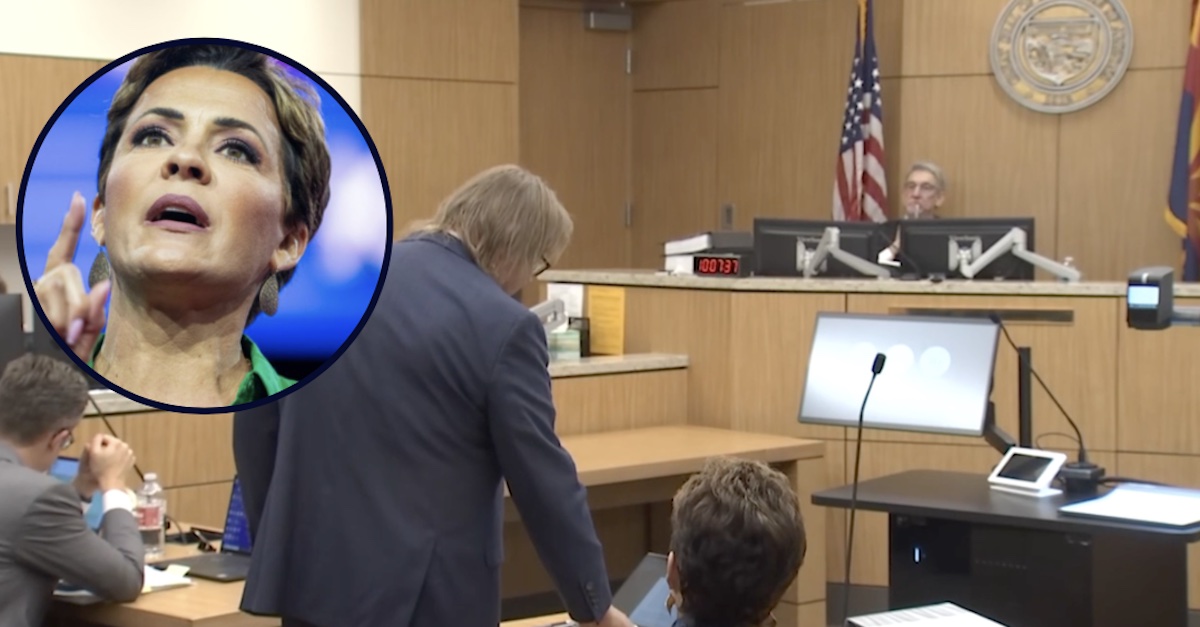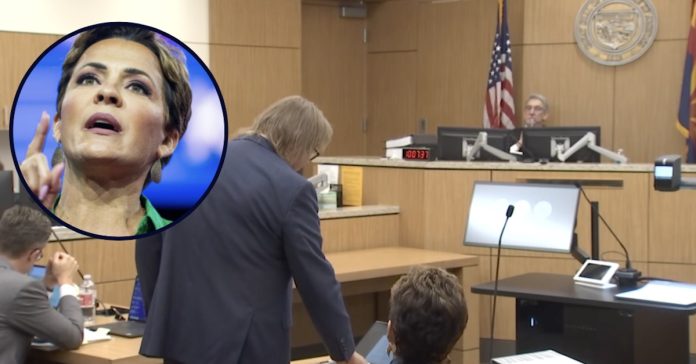
Kari Lake (inset AP Photo/Alex Brando, File), Judge John Hannah listens during Sept. 21 hearing (Arizona Republic/screengrab)
A state judge on Thursday rejected failed gubernatorial candidate Kari Lake’s (R) attempt to access 2022 election ballot affidavit envelopes, finding that to allow that inspection “would create a risk of widespread fraud where none exists at present.”
Maricopa County Superior Court Judge John Hannah has been a thorn in the side of Republicans’ election challenges since the 2020 cycle, whether by dismissing a case and calling an attempt to amend the filing “futile” or by ordering the Arizona Republican Party to pay $18,000 in attorneys’ fees for bringing a “groundless” lawsuit against Katie Hobbs, then the secretary of state and now the Democratic governor of the state who defeated Lake in the 2022 elections.
Hannah was no kinder to Lake in his latest ruling, writing that if he granted Lake what she asked for — ballot affidavit envelopes including “signatures of some 1.3 million Maricopa County voters, each conveniently presented with the voter’s name, address, and telephone number on the same page” — that “would create a risk of widespread fraud where none exists at present” and “also create a real possibility of voter harassment.”
The judge sided with Maricopa County Recorder Stephen Richer, an elected Republican who “testified that he believes the ‘chilling effect’ of public disclosure would significantly affect voter participation” and “threaten the ability of the Office of the Recorder to contact each voter and attempt to ‘cure”” defective ballots.
“The Court credits Mr. Richer’s testimony that disclosure of the ballot affidavit envelopes would create election integrity issues and depress voter participation,” Hannah wrote.
The judge then wrote that Lake’s view of how elections work reminded him of a “famous fable”:
Ms. Lake regards the electoral process much like the villagers in the famous fable regarded the goose that laid the golden egg, except that her goose failed to lay the egg she expected. She insists that something must have gone wrong. If only she could cut open the electoral process and examine each of its 1.3 million pieces, she says, she would be able to figure out what happened and show that the prize has been there waiting for her all along. And even if she doesn’t find what she’s looking for, she suggests, the act of disassembly will strengthen everyone’s confidence that the machinery produces reliable outcomes. We will know it lays the right eggs.
This view misses the big picture of democratic self-governance. Democratic self-governance by its nature requires counting votes, to make sure as best we can that the right egg comes out, but it is about much more than that.
Rejecting Lake’s case and “directing” Richer, if he chooses, to file for attorneys’ fees within 20 days, the judge concluded that the “broad right of electoral participation outweighs the narrow interests of those who would continue to pick at the machinery of democracy.”
Hannah emphasized, in closing, that granting Lake’s request would have heightened the risk of far-reaching consequences for voters:
It would create a significant risk of widespread voter fraud where none now exists. It would expose voters to harassment and potentially force them to defend the integrity of their own votes. Some number of voters would stop participating entirely, out of fear of identity theft or concern about privacy. But those individuals have exactly the same interest in being heard through the electoral process as those who voted for unsuccessful candidates in past elections. Their frustration and disillusionment are every bit as harmful to democratic self-government as the frustration and disillusionment of those who have come to doubt the “integrity” of the electoral process. The Court therefore “cannot sanction a result which tends to reduce citizen participation in the election process. That is too high a price to pay in a participatory democracy.”
In October, a federal appeals court refused to revive a Lake case that attempted to ban electronic voting machines from future elections. That lawsuit previously led to sanctions against the lawyers who brought it.
Lake, a former local news anchor and ally of former President Donald Trump, is now running for a U.S. Senate seat.
Have a tip we should know? [email protected]

